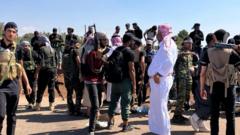Despite a recently brokered ceasefire agreement, tensions remain high in Southern Syria as Bedouin fighters and the Druze community grapple with a turbulent aftermath of violent clashes. The Bedouins, retreating from the contested city of Suweida, now occupy surrounding villages but have not ruled out the possibility of resuming hostilities. A UK-based monitoring group reported a cautious calm in the area but noted that tribal fighters were still launching attacks on nearby villages.
From the town of al-Mazara'a—previously controlled by Druze but recently overtaken by Bedouins and now under government authority—smoke billowed over the city, signaling unrest. At a nearby checkpoint—a makeshift barrier manned by armed government personnel—Bedouin fighters, frustrated by the lack of access to injured comrades they deem hostages, threatened to breach the blockade if their demands are not met. A Bedouin elder expressed determination to return to Suweida, highlighting deteriorating conditions for their kin left behind.
Tensions flared after the abduction of a Druze merchant, prompting violent confrontations between the Druze, Bedouins, and government forces. Reports indicate that both groups have committed acts of violence against each other as well as against civilians since fighting broke out, resulting in over 1,120 fatalities, according to the Syrian Observatory for Human Rights. Among the dead are hundreds of Druze fighters and civilians, alongside government security personnel and Bedouins.
Displacement has surged, with hospitals in Suweida lacking essential medical supplies as at least 128,000 individuals have fled their homes. Humanitarian efforts are underway, including the arrival of aid from the Syrian Red Crescent and medical supplies sent by Israel. In a refugee gathering in Mia'rbah, displaced Bedouins expressed skepticism over future coexistence with the Druze, citing a need for a stable government to ensure peace. “Without peace and security, we can’t live with them,” one woman stated emphatically, highlighting the distrust that deepens the divide.
As calls for accountability and justice grow louder internationally, the situation remains precarious, with many calling for urgent humanitarian relief and mediation to protect civilians in this fractured landscape.
From the town of al-Mazara'a—previously controlled by Druze but recently overtaken by Bedouins and now under government authority—smoke billowed over the city, signaling unrest. At a nearby checkpoint—a makeshift barrier manned by armed government personnel—Bedouin fighters, frustrated by the lack of access to injured comrades they deem hostages, threatened to breach the blockade if their demands are not met. A Bedouin elder expressed determination to return to Suweida, highlighting deteriorating conditions for their kin left behind.
Tensions flared after the abduction of a Druze merchant, prompting violent confrontations between the Druze, Bedouins, and government forces. Reports indicate that both groups have committed acts of violence against each other as well as against civilians since fighting broke out, resulting in over 1,120 fatalities, according to the Syrian Observatory for Human Rights. Among the dead are hundreds of Druze fighters and civilians, alongside government security personnel and Bedouins.
Displacement has surged, with hospitals in Suweida lacking essential medical supplies as at least 128,000 individuals have fled their homes. Humanitarian efforts are underway, including the arrival of aid from the Syrian Red Crescent and medical supplies sent by Israel. In a refugee gathering in Mia'rbah, displaced Bedouins expressed skepticism over future coexistence with the Druze, citing a need for a stable government to ensure peace. “Without peace and security, we can’t live with them,” one woman stated emphatically, highlighting the distrust that deepens the divide.
As calls for accountability and justice grow louder internationally, the situation remains precarious, with many calling for urgent humanitarian relief and mediation to protect civilians in this fractured landscape.



















